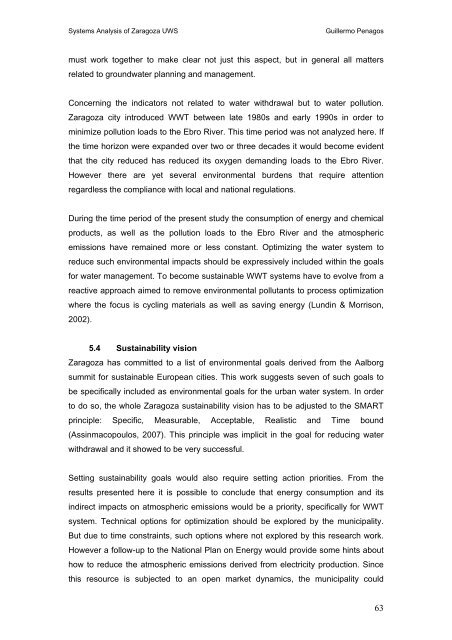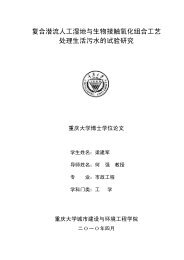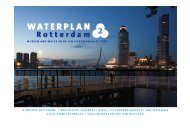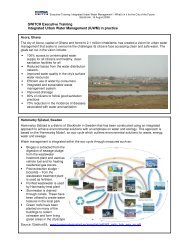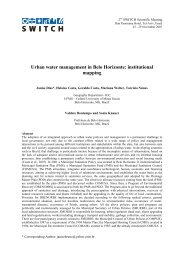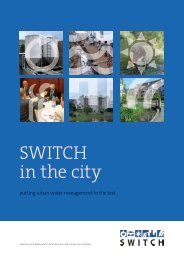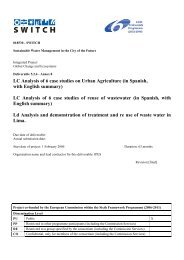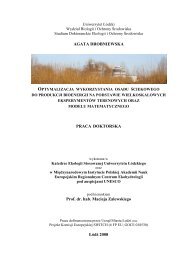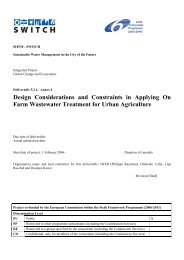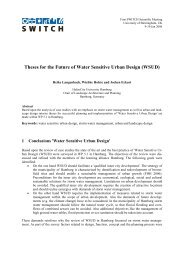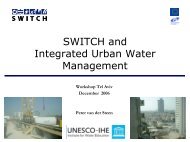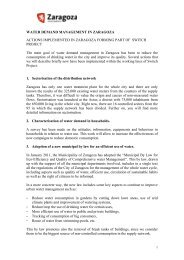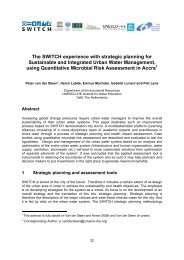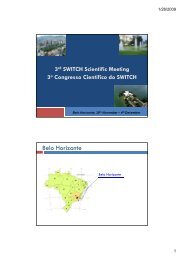Systems Analysis of Zaragoza Urban Water - SWITCH - Managing ...
Systems Analysis of Zaragoza Urban Water - SWITCH - Managing ...
Systems Analysis of Zaragoza Urban Water - SWITCH - Managing ...
You also want an ePaper? Increase the reach of your titles
YUMPU automatically turns print PDFs into web optimized ePapers that Google loves.
<strong>Systems</strong> <strong>Analysis</strong> <strong>of</strong> <strong>Zaragoza</strong> UWS<br />
Guillermo Penagos<br />
must work together to make clear not just this aspect, but in general all matters<br />
related to groundwater planning and management.<br />
Concerning the indicators not related to water withdrawal but to water pollution.<br />
<strong>Zaragoza</strong> city introduced WWT between late 1980s and early 1990s in order to<br />
minimize pollution loads to the Ebro River. This time period was not analyzed here. If<br />
the time horizon were expanded over two or three decades it would become evident<br />
that the city reduced has reduced its oxygen demanding loads to the Ebro River.<br />
However there are yet several environmental burdens that require attention<br />
regardless the compliance with local and national regulations.<br />
During the time period <strong>of</strong> the present study the consumption <strong>of</strong> energy and chemical<br />
products, as well as the pollution loads to the Ebro River and the atmospheric<br />
emissions have remained more or less constant. Optimizing the water system to<br />
reduce such environmental impacts should be expressively included within the goals<br />
for water management. To become sustainable WWT systems have to evolve from a<br />
reactive approach aimed to remove environmental pollutants to process optimization<br />
where the focus is cycling materials as well as saving energy (Lundin & Morrison,<br />
2002).<br />
5.4 Sustainability vision<br />
<strong>Zaragoza</strong> has committed to a list <strong>of</strong> environmental goals derived from the Aalborg<br />
summit for sustainable European cities. This work suggests seven <strong>of</strong> such goals to<br />
be specifically included as environmental goals for the urban water system. In order<br />
to do so, the whole <strong>Zaragoza</strong> sustainability vision has to be adjusted to the SMART<br />
principle: Specific, Measurable, Acceptable, Realistic and Time bound<br />
(Assinmacopoulos, 2007). This principle was implicit in the goal for reducing water<br />
withdrawal and it showed to be very successful.<br />
Setting sustainability goals would also require setting action priorities. From the<br />
results presented here it is possible to conclude that energy consumption and its<br />
indirect impacts on atmospheric emissions would be a priority, specifically for WWT<br />
system. Technical options for optimization should be explored by the municipality.<br />
But due to time constraints, such options where not explored by this research work.<br />
However a follow-up to the National Plan on Energy would provide some hints about<br />
how to reduce the atmospheric emissions derived from electricity production. Since<br />
this resource is subjected to an open market dynamics, the municipality could<br />
63


